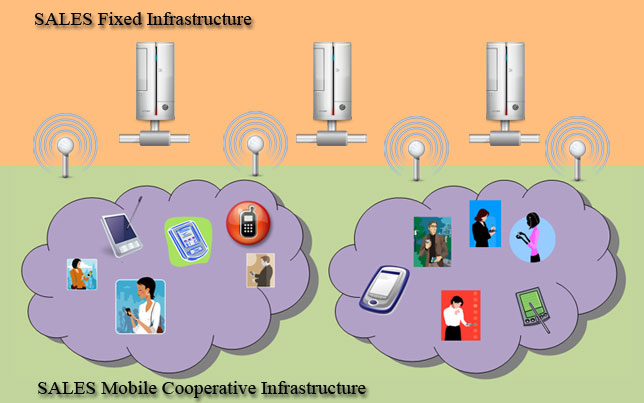SALES Principal Scenario
Our principal scenario contains different users randomly roaming with their associated mobile devices, like PDAs, laptops and cellular phones. Each device executes its own local context-aware applications, and uses its local lightweight SALES instance to participate in the final distributed architecture. Each application registers its context needs to the local SALES instance that, in its turn, takes care of context data retrieval and distribution. Besides, each application can register proper context data sources with the principal aim of generating and disseminating new context data.
As traditional mobile systems, SALES adopts an infrastructure-based approach to perform context data distribution and to ensure context data access. As innovative aspect, SALES uses also ad-hoc communications to reduce context data distribution burden. The joint usage of these opportunities enhances scalability, since the system experiments a final higher bandwidth, and system coverage, since we ensure access to mobile devices regardless of specific device capabilities (for instance, a traditional cellular phones with only a Bluetooth interface can obtain SALES infrastructure services using a dual-homed laptop as an intermediate router). However, we would like to precise that infrastructure presence is not mandatory for our solution, but rather it represents the only choice that ensures context data access.
To perform context data distribution based on ad-hoc links, SALES exploits the physical locality principle to group user nodes in physical proximity. Each cluster represents a cooperative environment in which each mobile device shares its local context data repositories by enacting as a context data source towards the other nodes. As better explained in the Architecture section, the cluster abstraction is useful to tailor context data distribution and to reduce management information scope.
To draw a conclusion, our principal scenario can be represented as follows. One or more fixed wireless infrastructures serve SALES mobile devices to enable context data access. Contemporary, these mobile devices self-adapt themselves to build cooperative clusters in which context data are exchanged using ad-hoc communications. Finally, multi-homed nodes enact as routers to bridge together the different involved wireless networks.
